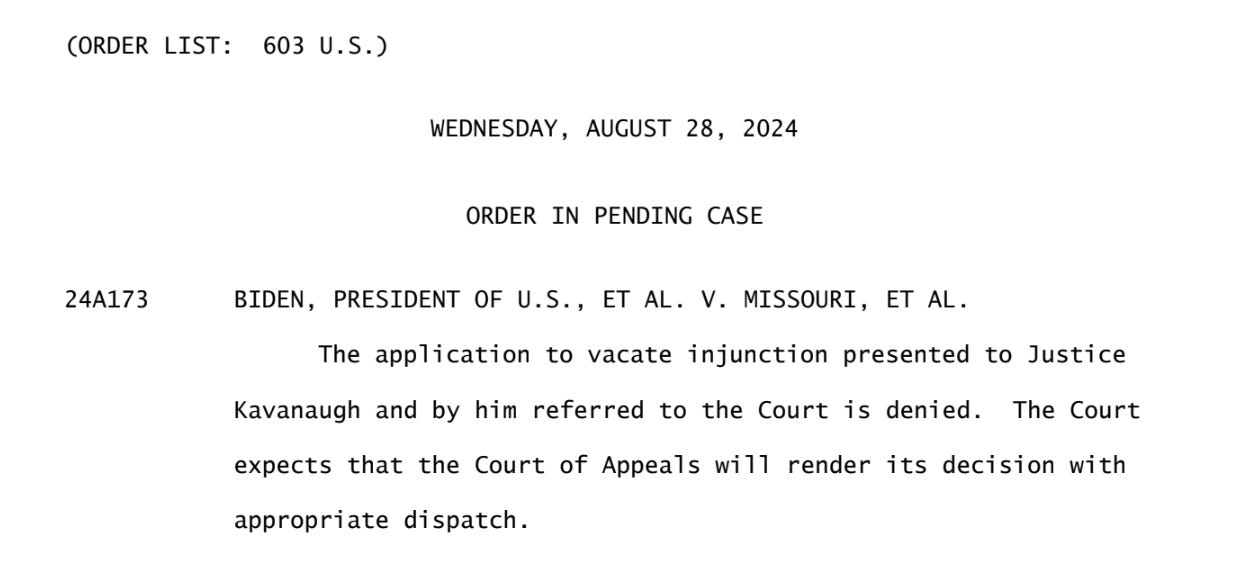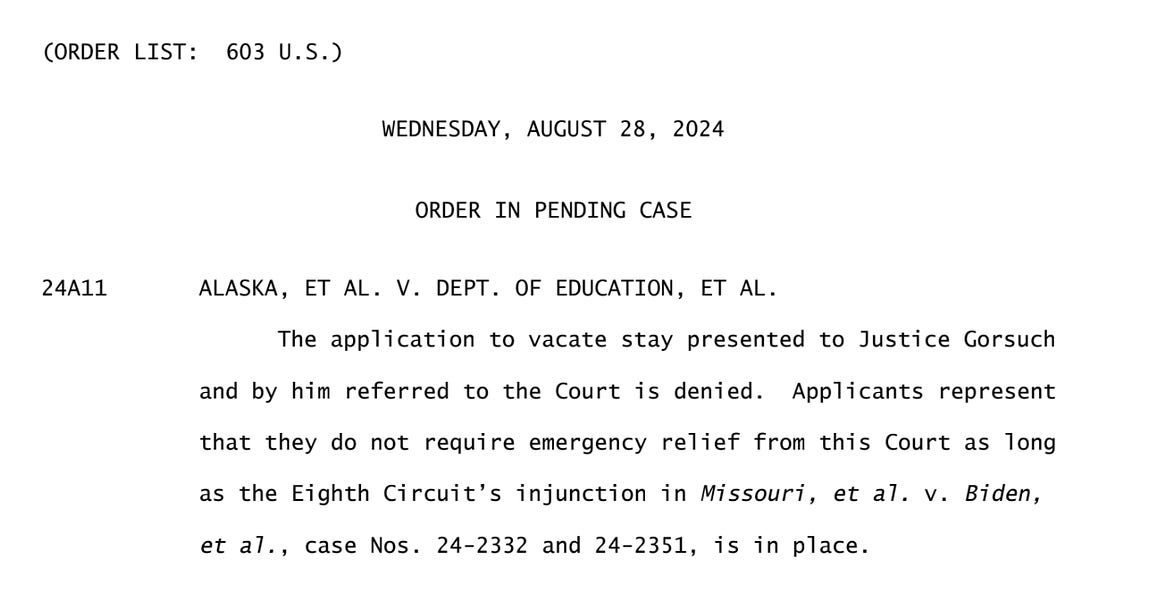Thank you for being one of more than 36,000 people supporting Law Dork with a free subscription! I am so grateful to everyone for reading, subscribing, and sharing Law Dork. That said, my independent legal journalism does cost money to produce. Please consider a paid subscription, as little as $6 a month, to Law Dork today. If you do that, you’ll receive bonus features available only to paid subscribers — and support this essential reporting. I know that not everyone can afford it or prioritize a paid subscription, and, if that’s you, I am so glad you are here! Thanks, Chris SCOTUS rejects DOJ request to let any of the SAVE student loan plan to go into effectUniversal injunctions are fine when the Supreme Court likes them.On Wednesday, the U.S. Supreme Court made clear that justices’ protest of universal injunctions is mere political rhetoric, allowing a lower court ruling to remain in place for now blocking one of the Biden administration’s latest student loan relief efforts nationwide. The justices — with no noted dissents — rejected a Justice Department request to vacate a universal injunction blocking the Education Department from implementing most of the Saving on a Valuable Education, or SAVE, program — and potentially more — while litigation is ongoing. Of four lower courts to consider the plan in two challenges brought by some Republican-led states, only the U.S. Court of Appeals for the Eighth Circuit fully blocked the plan during appeals. That order had followed an order from the U.S. Court of Appeals for the Tenth Circuit, which would have allowed the plan to go into effect during appeals. But on Wednesday, under the Supreme Court’s order, the Eighth Circuit’s nationwide injunction against implementation of the SAVE plan is the only one that matters for now. The Eighth Circuit’s injunction, moreover, also potentially blocks relief beyond the SAVE plan itself — including forgiveness under the previously existing REPAYE plan that the SAVE plan modifies. Solicitor General Elizabeth Prelogar, in a stark brief, had asked the justices to vacate that injunction because it was “vastly overbroad” on multiple grounds — and because it conflicted with the Tenth Circuit’s ruling. Additionally, and as detailed previously at Law Dork, regarding the legal merits of the underlying plan: This is a different program, taking different actions, and using a different law than the program blocked by the Supreme Court in 2023. None of that — the breadth, the conflict, or the fact that it’s a new program — mattered to the Supreme Court on Wednesday. The order denied the DOJ request with no explanation, merely noting, “The Court expects that the [Eighth Circuit] Court of Appeals will render its decision with appropriate dispatch.” Because of the order in the case out of the Eighth Circuit, moreover, the Supreme Court highlighted its own hypocrisy in another way. The justices also denied a request from the states whose lawsuit is subject to the Tenth Circuit’s order because they “do not require emergency relief from this Court as long as the Eighth Circuit’s injunction … is in place.” In other words, they didn’t need to win in their case because the Supreme Court allowed a nationwide injunction to remain in effect in another case. In the interim, most of the SAVE Plan — and, potentially, the REPAYE plan’s preexisting provision of forgiveness — is blocked nationwide. For borrowers, the Biden administration had previously announced that affected loans had been placed into forbearance. It appeared, per information provided about the Eighth Circuit injunction, that would continue after Wednesday’s order. The lessons of the current court are not about law. They are political lessons. Universal injunctions are bad when progressives win below — like in the challenge to Idaho’s ban on gender-affirming medical care for minors — or when conservative judges decide that a far-right lower-court win is inconvenient — like when Judge Matthew Kacsmaryk tried to ban mifepristone nationwide — but it is fine here. In the Idaho case, Justice Neil Gorsuch wrote extensively about how it was “a welcome development” that the court was taking on the issue of “universal” relief — when it came to stopping a state’s anti-transgender law. He continued, indignant at the breadth of the injunction:
Gorsuch also had questioned the breadth of lower court’s orders in oral arguments this past term, as covered by CBS News’s Melissa Quinn. Here, however, is the Eighth Circuit’s injunction allowed to remain in effect by Wednesday’s Supreme Court order:
Here is what Gorsuch had to say about that: Nothing. He wrote nothing. Justice Clarence Thomas also previously criticized nationwide injunctions — when they were being issued against the Trump administration. He, also, wrote nothing on Wednesday. Because of the order in the case out of the Eighth Circuit, moreover, the Supreme Court highlighted its own hypocrisy in another way. The justices also denied a request from the states whose lawsuit is subject to the Tenth Circuit’s order because they “do not require emergency relief from this Court as long as the Eighth Circuit’s injunction … is in place.” In other words, they didn’t need to win in their case because the Supreme Court allowed a nationwide injunction to remain in effect in another case.
You’re a free subscriber to Law Dork, with Chris Geidner. To further support this independent legal journalism, please consider becoming a paying subscriber. |



